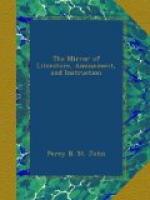This theatre was burnt down June 29, 1613, but it was rebuilt with greater splendour in the following year. The Cut represents the original theatre. The account of this accident is given by Sir Henry Wotton, in a letter dated July 2, 1613.[3] “Now to let matters of state sleepe, I will entertain you at the present with what happened this week at the Banks side. The King’s players had a new play called All is True, representing some principal pieces of the reign of Henry the Eighth, which set forth with many extraordinary circumstances of pomp and majesty even to the matting of the stage; the knights of the order with their Georges and Garter, the guards with their embroidered coats, and the like: sufficient in truth within awhile to make greatness very familiar, if not ridiculous. Now King Henry making a Masque at the Cardinal Wolsey’s house, and certain cannons being shot off at his entry, some of the paper or other stuff, wherewith one of them was stopped, did light on the thatch, where being thought at first but idle smoak, and their eyes more attentive to the show, it kindled inwardly, and ran round like a train, consuming within less than an hour the whole house to the very ground. This was the fatal period of that virtuous fabrick, wherein yet nothing did perish but wood and straw, and a few forsaken cloaks; only one man had his breeches set on fire, that would perhaps have broyled him, if he had not by the benefit of a provident wit, put it out with a bottle of ale.”
From a letter of Mr. John Chamberlaine to Sir Ralph Winwood, dated July 8, 1613, in which this accident is likewise mentioned, we learn that the theatre had only two doors.[4] “The burning of the Globe or playhouse on the Bankside on St. Peter’s day cannot escape you; which fell out by a peal of chambers, (that I know not upon what occasion were to be used in the play,) the tampin or stopple of one of them lighting in the thatch that covered the house, burn’d it down to the ground in less than two hours, with a dwelling-house adjoyning; and it was a great marvaile and a fair grace of God that the people had so little harm, having but two narrow doors to get out.”
In 1613, was entered in the Stationers’ books, “A doleful ballad of the General Conflagration of the famous Theatre called the Globe.”
Taylor, the water poet, commemorates the event in the following lines:
“As gold is better that in fire’s
tried,
So is the Bankside Globe,
that late was burn’d;
For where before it had a thatched hide,
Now to a stately theatre ’tis
turn’d;
Which is an emblem that great things are
won;
By those that dare through
greatest dangers run.”
It is also alluded to in some verses by Ben Jonson, entitled, “An Execration upon Vulcan,” from which it appears that Ben Jonson was in the theatre when it was burnt.




